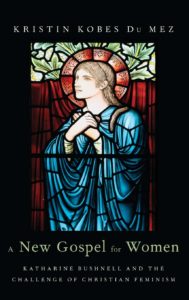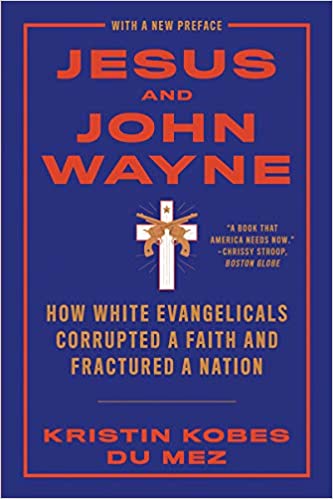Title: Jesus and John Wayne: How White Evangelicals Corrupted a Faith and Fractured a Nation
Author: Kristin Kobes Du Mez
Publisher: Liveright Publishing Company, a division of W. W. Norton and Company, Inc.
Pages: 304
Reviewer: Carolyn Custis James
In 2016, many observers were stunned at evangelicals’ apparent betrayal of their own values. In reality, evangelicals did not cast their vote despite their beliefs, but because of them. Jesus and John Wayne1
Most Americans can tell you exactly where they were in 2016 when they heard the news that Americans had elected Donald J. Trump as the 45th U.S. president. It was a stunning moment in American history for both supporters and detractors. Pundits and pollsters attributed his win largely to 81% of American evangelicals who voted for him. This evangelical voting bloc was reinforced by public endorsements from a line-up of well-known evangelical leaders, such as James Dobson, Jerry Falwell, Jr., Franklin Graham, Wayne Grudem, Robert Jeffress, and Eric Metaxas.
For many it was difficult to imagine a more jarring dissonance than the one between historic Christian ethics and evangelical enthusiasm for Donald Trump. Trusted evangelical leaders had long been preaching morality and “family values.” Now these fierce proponents who preached that “character matters” were backing a candidate who was the flagrant antithesis, not only of everything they had championed throughout their careers, but more significantly who was shamelessly antithetical to the teachings and example of Jesus.
Evangelicals had become politicized. For a significant majority, filling courts with conservative judges, ending Roe v. Wade, and building a border wall, justified electing a president who is, as Pastor Robert Jeffress put it, “the meanest, toughest, son-of-a-you-know-what.”2
Even the Washington Post’s release of the Access Hollywood tape that caught Trump boasting lewdly of sexually assaulting women—and over a dozen women came forward with allegations that he had done exactly that to them—was not a bridge too far for Trump’s white evangelical loyalists. They stood enthusiastically before cameras and large crowds and published lengthy articles to reaffirm their support and convince evangelicals that a vote for Trump was a “moral choice.”
In her eye-opening book, Jesus and John Wayne: How White Evangelicals Corrupted a Faith and Fractured a Nation, Calvin University Professor of History and Gender Studies, Kristin Kobes Du Mez (pronounced Mey), combined American evangelical history, current political developments, and the questions that were swirling to connect the dots.
She traces the history of white American evangelicalism from the late 19th century to the present to make sense of how we got here. Already, by the 1890s, American culture was changing as economic, social, and cultural forces began to threaten the cultural status quo and the reigning definition of masculinity.
By the early twentieth century, Christians recognized that they had a masculinity problem. . . . When “old ideas of manhood seemed insufficient . . . white native-born Protestant men began to assert a new kind of masculinity—a rougher, tougher masculinity. Nothing less than the fate of the nation, even the future of white Christian ‘civilization,’ appeared to be at stake.”3
White evangelicals set out to recover traditional gender roles. Their effort to re-assert a stronger, more militant masculinity is what brought Hollywood actor and ardent political conservative John Wayne into the picture as a convenient icon of Christian masculinity. The goal was to restore a tougher white male patriarchal authority in the home, the church, and the wider culture. According to their assessment, this was the biblical ideal and what America needed.
Du Mez’s detailed history demonstrates how this movement acquired power—both evangelical and political—as their following and influence grew and how their chief agenda centered on reinforcing patriarchy, male authority, and female submission in the church, home, and wider culture. Over time there was a growing fusion of conservative Christian values with conservative politics and the deepening conviction among white evangelicals that they had a special, indeed a providential, mission to preserve and protect white Christian America.4
Du Mez makes the case that the arc of patriarchy bends towards disaster.
Rev. Martin Luther King is remembered for saying, “The moral arc of the universe is long, but it bends toward justice.”[5] Dr. Du Mez concludes her book with devastating evidence that makes it hard to avoid concluding that the arc of patriarchy bends toward disaster. In the final chapter, “Evangelical Mulligans,” she documents the broken state of things within the white evangelical church—widespread evidence of an epidemic of clergy sexual abuse and violence against women and children that raises disturbing and uncomfortable questions that cannot be ignored. Tragically, none of this is news.
Clergy sexual abuse isn’t only a Roman Catholic problem. The facts tell us the problem is as severe if not greater inside the evangelical church—perpetrated by evangelical leaders who abuse their male power to violate the very women, men, and children they are called to pastor and nurture. The collective impact on display in this closing chapter and the appalling ability of abusers to recycle themselves right back into ministry tells us we pay a terrible price for refusing to address the issues she is raising.
 Jesus and John Wayne was not Du Mez’s first foray into the impact of patriarchy in evangelicalism. In 2015 she published a book that is profoundly relevant to these issues, research that influenced her decision to write Jesus and John Wayne. That earlier book, A New Gospel for Women: Katharine Bushnell and the Challenge of Christian Feminism, was Du Mez’s PhD dissertation at the University of Notre Dame.
Jesus and John Wayne was not Du Mez’s first foray into the impact of patriarchy in evangelicalism. In 2015 she published a book that is profoundly relevant to these issues, research that influenced her decision to write Jesus and John Wayne. That earlier book, A New Gospel for Women: Katharine Bushnell and the Challenge of Christian Feminism, was Du Mez’s PhD dissertation at the University of Notre Dame.
During the Victorian era, Christian women were significant leaders in missionary work and social activism both stateside and globally. An American Midwesterner, Dr. Katharine Bushnell became a high-ranking leader in this global Christian movement designed to disciple Christian women, spread the gospel, and address abuses against women and girls. Bushnell was a skilled medical doctor, a biblical scholar, and an early feminist in the inaugural days of that movement when feminism and Christianity were closely aligned. Her work with women led her to see the same kinds of sexual violence perpetrated by Christian men against women that continue to fester today.
Her reform work introduced her to women in tawdry houses of prostitution in Wisconsin lumber camps, in British army brothels in colonial India, and in the ‘vice dens’ that sprang up throughout East Asia wherever Western influence was present, and in each case she observed Christian men treating women with astonishing cruelty. Not only did Christian men commit despicable acts against women, Bushnell noted, but they often did so with impunity, continuing to be revered in their communities as respectable Christian gentlemen.6
As she worked to disciple marginalized women, Bushnell observed Western Christian men committing despicable acts against women all around the world, and they often did so with impunity, continuing to be revered in their communities as respectable Christian gentlemen.
Bushnell’s conclusion was earthshaking. She came to believe that Christian teaching itself was the heart cause of the problem. Investing time in other global and intensely patriarchal cultures led her to question Christian teaching about male/female relationships and patriarchy in particular. This was long before the United Nations Secretary General’s 2006 report, “Ending Violence Against Women: From Words to Action,” identified patriarchy as the root cause of violence against women.
The roots of violence against women lie in historically unequal power relations between men and women and pervasive discrimination against women in both the public and private spheres. Patriarchal disparities of power, discriminatory cultural norms and economic inequalities serve to deny women’s human rights and perpetuate violence. Violence against women is one of the key means through which male control over women’s agency and sexuality is maintained.7
Bushnell had already reached the same conclusion.
Her resulting scholarly work on Bible translations and theology was ground-breaking. The tragedy is that she too was subject to patriarchal power. Her work was forgotten, and her warnings ignored for over a hundred years. One wonders if evangelical leaders had taken her work seriously, would we still be in the throes of such cultural upheaval or would the Christian church be the place of safety, healing, and human flourishing that Jesus calls his followers to be?
Professor Du Mez has sounded an urgent alarm. Twice. Both books raise the question, is Christian theology part of the problem? Or to pose the question even more pointedly, does patriarchal teaching create an environment that is conducive to the sexual abuse of women and children? How one answers these questions may determine the future of American evangelicalism.
Notes
1 Du Mez, Kristin Kobes, Jesus and John Wayne How White Evangelicals Corrupted a Faith and Fractured a Nation, (New York: Liveright Publishing , 2020), 3.
2 Ibid., 258.
3 Ibid., 15.
4 Ibid., 59
5 Martin Luther King, “Our God is Marching on!” Speech delivered March 25, 1965 in Selma, Alabama. (Stanford University, The Martin Luther King, Jr. Research and Education Institute) https://kinginstitute.stanford.edu/our-god-marching This is one of several of Reverend Martin Luther King’s speeches that included this quote. King was paraphrasing the work of reformer, abolitionist, and Unitarian pastor, Theodore Parker (1810 – 1860), who originated the quote in reference to the abolitionist movement. The original quote comes from Theodore Parker, Ten Sermons of Religion (Boston: Crosby, Nichols and Company, 1853), 84-85: “I do not pretend to understand the moral universe; the arc is a long one, my eye reaches but little ways; I cannot calculate the curve and complete the figure by the experience of sight; I can divine it by conscience. And from what I see I am sure it bends towards justice.”
6 Du Mez, Kristin Kobes, A New Gospel for Women: Katharine Bushnell and the Challenge of Christian Feminism, (Oxford: Oxford University Press, 2015), 4.
7 “Ending violence against women: From words to action. Study of the Secretary-General,” https://www.unwomen.org/-/media/headquarters/media/publications/un/en/englishstudy.pdf?la=en&vs=954, (United Nations Publication, 2006), 38.


2 thoughts on “Review: Jesus and John Wayne: How White Evangelicals Corrupted a Faith and Fractured a Nation”
Before and during the presidential election of 2020 did you recommend an alternative to Donald Trump for whom someone could vote?
How people vote is a private matter. So no, I don’t tell people how to vote. But public endorsements coming from the evangelical leaders named above is an entirely different matter and warrants a response. They’ve sent a terrible value statement to women both inside and beyond the church, ~especially~ to those who’ve suffered the trauma and abuse these leaders were willing to overlook. It has done a lot of damage. Surely you can see the contradictions between what they’ve preached and the public stance they’ve taken. Thankfully American ballots offer more than one choice. -CJ